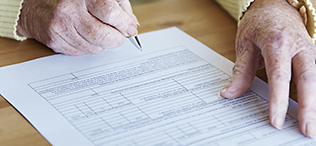All litigants should be represented by competent counsel. Until we can achieve that ideal, however, we must find ways to simplify our system for those who lack the money to hire a lawyer.
- Former Chief Justice Wallace Jefferson
There are times in our lives where court involvement is necessary. Divorce, child custody and visitation, landlord-tenant disputes, consumer scams, guardianships, health care and probate issues are just a few of the many reasons a person may find themselves in court and in need of an attorney.
In today’s economic climate, more and more people find that they cannot afford to hire an attorney. Legal aid organizations do not have sufficient funding to hire enough staff to serve all the people who need their services and most who qualify are turned away. Only about 20% of people eligible for legal aid services are able to get the assistance they need.
For people who are unable to get help through legal aid and who cannot afford a private attorney, the only option is to represent themselves in court. People who represent themselves are referred to as “pro se,” “self-represented,” or “unrepresented” litigants.
Our court system was designed for attorneys and most unrepresented people have a difficult time navigating the system. Without the advice and assistance of an attorney, self-represented litigants may not be able to effectively advocate for their rights. They may also fail to follow the proper rules and procedure to get their case heard or resolved in court.
Providing pro se litigants with the resources and tools they need to solve their own legal matters is a critical component of ensuring our judicial system is accessible to everyone who needs it.
The Commission coordinates a wide variety of self-help efforts to expand access to the courts for pro se litigants. Our Self-Represented Litigants Committee works on different pieces of the self-represented litigants (SRL) puzzle through its subcommittees. These committees oversee several initiatives:
Assisted Pro Se
Assisted Pro Se is the practice of helping self-represented litigants help themselves with limited assistance from lawyers.
The Commission’s Assisted Pro Se Subcommittee developed a manual titled “Best Practices in Assisted Pro Se Models for the Unrepresented” that helps legal service providers develop their own assisted pro se programs. Contact Texas Access to Justice Commission at ATJMail@TexasBar.com or 512-427-1855 for more information.
Reduced Fee Panels
People who are not eligible for legal aid but who cannot afford to pay an attorney’s regular hourly rate may be able to get help from a lawyer who agrees to handle cases on a reduced fee basis. Clients are typically referred to these attorneys through a lawyer referral service and receive a 30-minute consultation for a minimal fee. The client is free to choose to hire the lawyer on a reduced fee basis or not.
Most urban communities have a local lawyer referral service to help people find an attorney who can provide the type of legal services needed. The State Bar of Texas operates a lawyer referral service for areas of the state that do not have a local lawyer referral service. The Legal Services Support Division of the State Bar of Texas produces a yearly referral directory that has the contact information for all the lawyer referral services in the state of Texas. To learn about reduced fee panels in your area, call 512.427.1855.
Videoconferencing Technology
Videoconferencing technology makes it possible for attorneys who live in urban areas to help self-represented litigants who live in rural parts of our state. This assistance provides self-represented litigants with legal guidance on their case and increases courthouse efficiency by having better prepared litigants when they appear in court.
New technologies present new opportunities to increase access to legal assistance across the state and help to close the justice gap.





